 Descending to lower Belen, the crowded market awakens our senses. Merchants sell roasted worms, chicken feet and pure tobacco. Vultures line the narrow passageways at ground level.
Descending to lower Belen, the crowded market awakens our senses. Merchants sell roasted worms, chicken feet and pure tobacco. Vultures line the narrow passageways at ground level.
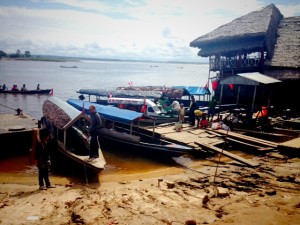 This is the hardest part of Iquitos, an Amazon gateway city in Peru. Thousands of people live in challenging conditions on the riverbed.
This is the hardest part of Iquitos, an Amazon gateway city in Peru. Thousands of people live in challenging conditions on the riverbed.
In our first hour we see awful things. The boat launch is an ever thickening rubbish heap. Much trash and at least some human waste goes into the narrow inlet, and yet people likely rely on the water for certain domestic purposes. A boy pisses where we walk. The prostitutes look very young.
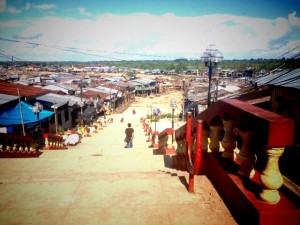 A young man not at all well in the head approaches the café table next to me and abruptly lifts a beer from the seat of an older man who is holding a baby. He hastily chugs the beer, splashing the baby. The older man retaliates by punching him as hard as he can in the jaw. The young man retreats whimpering and waiving his hand in submission, still drinking the beer as he goes.
A young man not at all well in the head approaches the café table next to me and abruptly lifts a beer from the seat of an older man who is holding a baby. He hastily chugs the beer, splashing the baby. The older man retaliates by punching him as hard as he can in the jaw. The young man retreats whimpering and waiving his hand in submission, still drinking the beer as he goes.
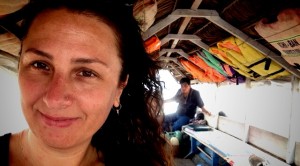 I am traveling with Alejandra Alayza, a political coordinator with Oxfam and founder of the Peruvian economic justice group RedGE (the Network for Globalization with Equity). Ale lays a questioning eye on some of the Amazonian hardwoods for sale. Legal extractive
I am traveling with Alejandra Alayza, a political coordinator with Oxfam and founder of the Peruvian economic justice group RedGE (the Network for Globalization with Equity). Ale lays a questioning eye on some of the Amazonian hardwoods for sale. Legal extractive  business has consequences enough here, let alone the black market Amazonian trades. She talks to me about the “paquetazo”: a hotly
business has consequences enough here, let alone the black market Amazonian trades. She talks to me about the “paquetazo”: a hotly 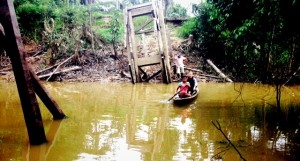 debated law reform package that would strip Peru’s environmental ministry of regulatory powers. “Somos un pais modelo,” she mocks in a heartfelt lament. Peru is supposed to be a model developing economy, according to some neoliberal reformers. It is hard to give that idea credence in Belen.
debated law reform package that would strip Peru’s environmental ministry of regulatory powers. “Somos un pais modelo,” she mocks in a heartfelt lament. Peru is supposed to be a model developing economy, according to some neoliberal reformers. It is hard to give that idea credence in Belen.
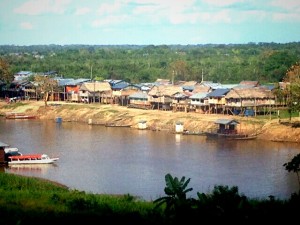 I wonder to what extent I would acclimate if I lived here. I suppose a billion people, perhaps more, live or work in similar conditions worldwide. Residents endured a 2011 flood that submerged the town; yet here they are, selling and dancing.
I wonder to what extent I would acclimate if I lived here. I suppose a billion people, perhaps more, live or work in similar conditions worldwide. Residents endured a 2011 flood that submerged the town; yet here they are, selling and dancing.
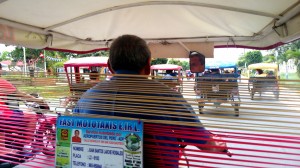 We ride a three-wheeled taximoto to the boardwalk and talk about change. Alejandra’s critique of the paquetazo reached Washington this week. Commercial interests retaliated in the Peruvian press they dominate.
We ride a three-wheeled taximoto to the boardwalk and talk about change. Alejandra’s critique of the paquetazo reached Washington this week. Commercial interests retaliated in the Peruvian press they dominate.
Alejandra has advanced a concept of post-extractivism, or alternatives to 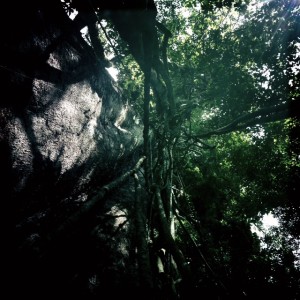 extractive industries like timber and oil for frontier economies like this one. Her ideas remind me of some work I did a decade ago in Venezuela’s Orinoco river delta. We talk of how we might be able to work these problems in the years ahead.
extractive industries like timber and oil for frontier economies like this one. Her ideas remind me of some work I did a decade ago in Venezuela’s Orinoco river delta. We talk of how we might be able to work these problems in the years ahead.
Sunset on the boardwalk is no less beautiful for chaos, and we prepare for a trip on the Amazon river.
Photos by Peter Maybarduk and Alejandra Alayza. Learn more about post-extractivism and the Peruvian Network for Globalization with Equity, RedGE.

